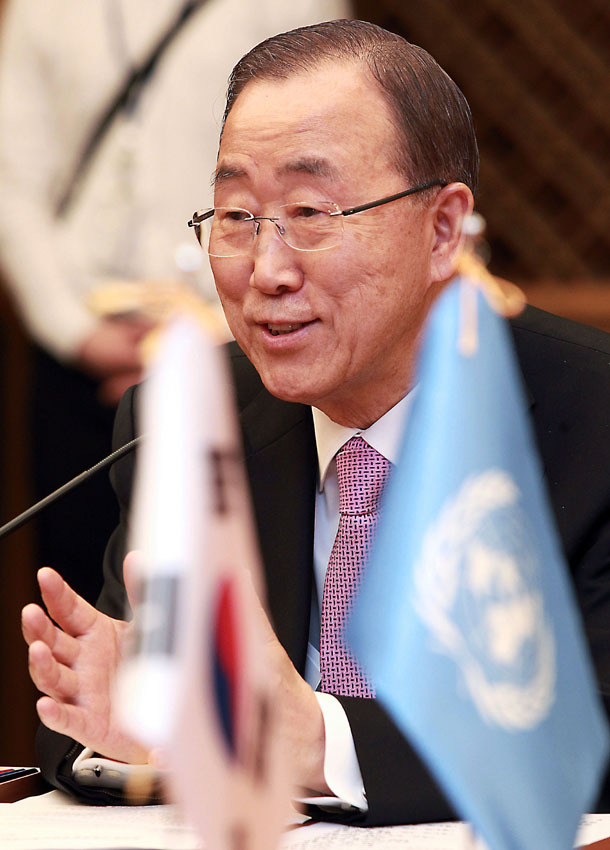U.N. Secretary-General Ban Ki-moon said Wednesday that North Korea has called off his planned visit to an inter-Korean industrial complex in the North.
Ban was scheduled to visit the North’s border city of Gaeseong on Thursday to meet with South Korean businesses and North Korean workers inside the factory park.
“They are reversing the decision for me to visit the Gaeseong Industrial Complex. No explanation was given for this last-minute change,” Ban said during a speech at the Seoul Digital Forum. “This decision by Pyongyang is deeply regrettable.”
 |
| U.N. Secretary-General Ban Ki-moon visits the National Assembly in Seoul, Wednesday. (Yonhap) |
Ban, who announced his planned visit during the World Education Forum on Tuesday, would have been the first U.N. chief to visit the complex since its launch in 2004.
He would also have been the first U.N. chief to visit North Korea in more than 20 years.
In announcing the visit Tuesday, Ban said he hoped to help promote reconciliation between the two Koreas.
“However, I, as the Secretary-General of the United Nations, will not spare any efforts to encourage the DPRK to work with the international community for peace and stability on the Korean Peninsula and beyond,” he said. The DPRK is the acronym for the North’s official name, the Democratic People’s Republic of Korea.
In a separate meeting with South Korean parliamentary leaders, Ban also said he will make efforts to ease tension on the divided peninsula. National Assembly Speaker Chung Eui-hwa called North Korea’s decision a “discourtesy” to the U.N. and urged North Korea to invite Ban to Pyongyang as a sign of an apology.
Many expected his trip to help resolve stand-offs between the two Koreas, including the wage row at the complex, where about 53,000 North Korean workers are employed there by 124 South Korean firms.
The joint factory park, which opened in 2004, is the last remaining symbol of inter-Korean reconciliation following a landmark inter-Korean summit in 2000. It has served as a major revenue source for the cash-strapped communist North and is where South Korea has utilized cheap but skilled North Korean laborers.
The Ministry of Unification expressed regret on Wednesday over North Korea’s abrupt decision and called on Pyongyang to make efforts to improve inter-Korean relations.
“It is regrettable that North Korea rescinded its approval of Ban’s visit to the complex, which had been pursued to bring peace and security to the peninsula and to help improve the inter-Korean ties,” Lim Byeong-cheol, ministry spokesman, told a press briefing.
Lim said that Seoul is urging Pyongyang not to further walk on a path to international isolation and to make efforts to bring peace to the Korean Peninsula.
North Korea’s move is widely expected to dampen hopes that Ban’s visit may serve as a catalyst for the improvement in the frayed inter-Korean relations.
North Korea has continued to make provocations in violation of U.N. Security Council resolutions banning the North from conducting nuclear tests and missile launches. The North recently claimed that it successfully test-fired a ballistic missile from a submarine.
The North’s alleged brutal execution of its defense chief Hyon Yong-chol has also added to concerns about a reign of terror in the communist regime and the North’s leader Kim Jong-un’s erratic behavior.
It was not the first time that Pyongyang made a last-minute cancellation of trips by high-profile figures to the North, including a 2014 scuttled visit by Robert King, U.S. special envoy for North Korean human rights.
Experts said that the North’s move seemed to reflect the bellicose country’s intention not to have dialogue with Seoul. The North also might show its complaint against the South over what it believed were annoying comments on the North’s rule.
President Park Geun-hye said last week that the North’s reign of terror has stoked security concerns in the region.
“North Korea might think that it may be better for it to raise tension on the peninsula for its response to the global community’s pressure against the North and to tighten its grip on internal politics,” said Chang Yong-seok, a senior researcher at the Institute for Peace and Unification Studies under Seoul National University. (Yonhap)



